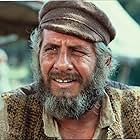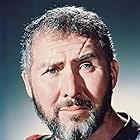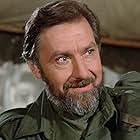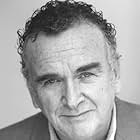After World War II, in an Austrian camp for displaced people, an interpreter mediates between the British and the Soviets regarding the fate of various refugees.After World War II, in an Austrian camp for displaced people, an interpreter mediates between the British and the Soviets regarding the fate of various refugees.After World War II, in an Austrian camp for displaced people, an interpreter mediates between the British and the Soviets regarding the fate of various refugees.
Hana Maria Pravda
- Beata
- (as Hana-Maria Pravda)
- Director
- Writers
- All cast & crew
- Production, box office & more at IMDbPro
Storyline
Did you know
- TriviaAlysoun Austin's feature-film debut, playing the role of "A.T.S. Driver."
- GoofsThe John Hurt character (Lieutenant Pilkington) has long hair, like John Lennon, not in keeping with British army regulations.
- Quotes
Major Burnside: What languages do you speak?
Janovic: Russian, Polish, Greek, Hungarian, German, Romanian, Bulgar, Serbo-Croat, Romani, Italian, some Arabic, some Yiddish, a little Chinese.
- Crazy creditsOpening credits prologue: OCCUPIED AUSTRIA SPRING, 1945
Featured review
Chaim Topol's career seems to have dwindled into endless revivals of his great role in 'Fiddler on the Roof' (cf Yul Brynner and 'The King and I'). So it's piquant to reconsider his first big break in Hollywood, two years before the film of 'Fiddler' catapulted him to fame.
'Before Winter Comes' highlights the decline of another once-rampant talent, director J. Lee Thompson. It is a mildly diverting entertainment, notable if only for its unusual setting: not World War two but its chaotic and tragic aftermath in four-power-divided Austria, with refugees in camps or roaming the snowy landscape looking for a home.
The centre of the story is an uneasy love/hate liaison. In the blue corner, bored, stiff, combat-nostalgic British senior officer David Niven ('I am nobody's old boy!'). In the red corner, a wily, Schweik-ish ex-Soviet displaced person whose polylinguality recommends him as a go-between when the UK occupying power is trying to co-exist with Stalin's boys as 'firm friends-- friends but firm'.
Niven could by now play a uniformed part asleep, and occasionally seems to have taken that as an order. His career was in low water at the time. It is a quieter part than in most of the ghastly comedies and capers he was doing at the time, but his bland technique is unaltered. Topol is fire to the Briton's ice: winking, grinning, suddenly looking sober and all-business, but how much is sincere and how much the pedlar's spiel? He's adequate, but Zorba-the-Greekishly unidimensional. Perhaps he always wanted to be liked a wee bit too much.
The film begins as lightish comedy, and tries for a change of pace to gravity and Cold War ominousness after Anna Karina insinuates a disturbing element as the love interest. But the gears clash. It looks like an Alistair McLean international adventure with more laughs, sprinkling doughty British thespians generously (Anthony Quayle as a brigadier, an amazingly unravaged John Hurt as a green junior officer) amid the Babel of displacement. Ron Grainer furnishes a whistling-squaddies theme to make you think of 'Bridge on the River Kwai', but the film lacks Lean's dedication to detail in the service of its message. Ultimately any theme deeper than 'Can't we all just get along?' is elusive. Nor is there any 'Great Escape' element to up the suspense.
The script was by Andrew Sinclair, a curious import to movies (Old Etonian, Cambridge academic, author of satirical novels) who sporadically tried to adapt his sour view of Britain to celluloid. The film looks too much 1969 rather than 1945, with Topol heavily hairy and a plethora of flashy zooms from Gilbert Taylor, Thompson's regular collaborator. They had been together, with Quayle, on 'Ice Cold in Alex'... which, alas, shows what a difference eleven years can make.
'Before Winter Comes' highlights the decline of another once-rampant talent, director J. Lee Thompson. It is a mildly diverting entertainment, notable if only for its unusual setting: not World War two but its chaotic and tragic aftermath in four-power-divided Austria, with refugees in camps or roaming the snowy landscape looking for a home.
The centre of the story is an uneasy love/hate liaison. In the blue corner, bored, stiff, combat-nostalgic British senior officer David Niven ('I am nobody's old boy!'). In the red corner, a wily, Schweik-ish ex-Soviet displaced person whose polylinguality recommends him as a go-between when the UK occupying power is trying to co-exist with Stalin's boys as 'firm friends-- friends but firm'.
Niven could by now play a uniformed part asleep, and occasionally seems to have taken that as an order. His career was in low water at the time. It is a quieter part than in most of the ghastly comedies and capers he was doing at the time, but his bland technique is unaltered. Topol is fire to the Briton's ice: winking, grinning, suddenly looking sober and all-business, but how much is sincere and how much the pedlar's spiel? He's adequate, but Zorba-the-Greekishly unidimensional. Perhaps he always wanted to be liked a wee bit too much.
The film begins as lightish comedy, and tries for a change of pace to gravity and Cold War ominousness after Anna Karina insinuates a disturbing element as the love interest. But the gears clash. It looks like an Alistair McLean international adventure with more laughs, sprinkling doughty British thespians generously (Anthony Quayle as a brigadier, an amazingly unravaged John Hurt as a green junior officer) amid the Babel of displacement. Ron Grainer furnishes a whistling-squaddies theme to make you think of 'Bridge on the River Kwai', but the film lacks Lean's dedication to detail in the service of its message. Ultimately any theme deeper than 'Can't we all just get along?' is elusive. Nor is there any 'Great Escape' element to up the suspense.
The script was by Andrew Sinclair, a curious import to movies (Old Etonian, Cambridge academic, author of satirical novels) who sporadically tried to adapt his sour view of Britain to celluloid. The film looks too much 1969 rather than 1945, with Topol heavily hairy and a plethora of flashy zooms from Gilbert Taylor, Thompson's regular collaborator. They had been together, with Quayle, on 'Ice Cold in Alex'... which, alas, shows what a difference eleven years can make.
- How long is Before Winter Comes?Powered by Alexa
Details
- Runtime1 hour 43 minutes
- Aspect ratio
- 1.85 : 1
Contribute to this page
Suggest an edit or add missing content























